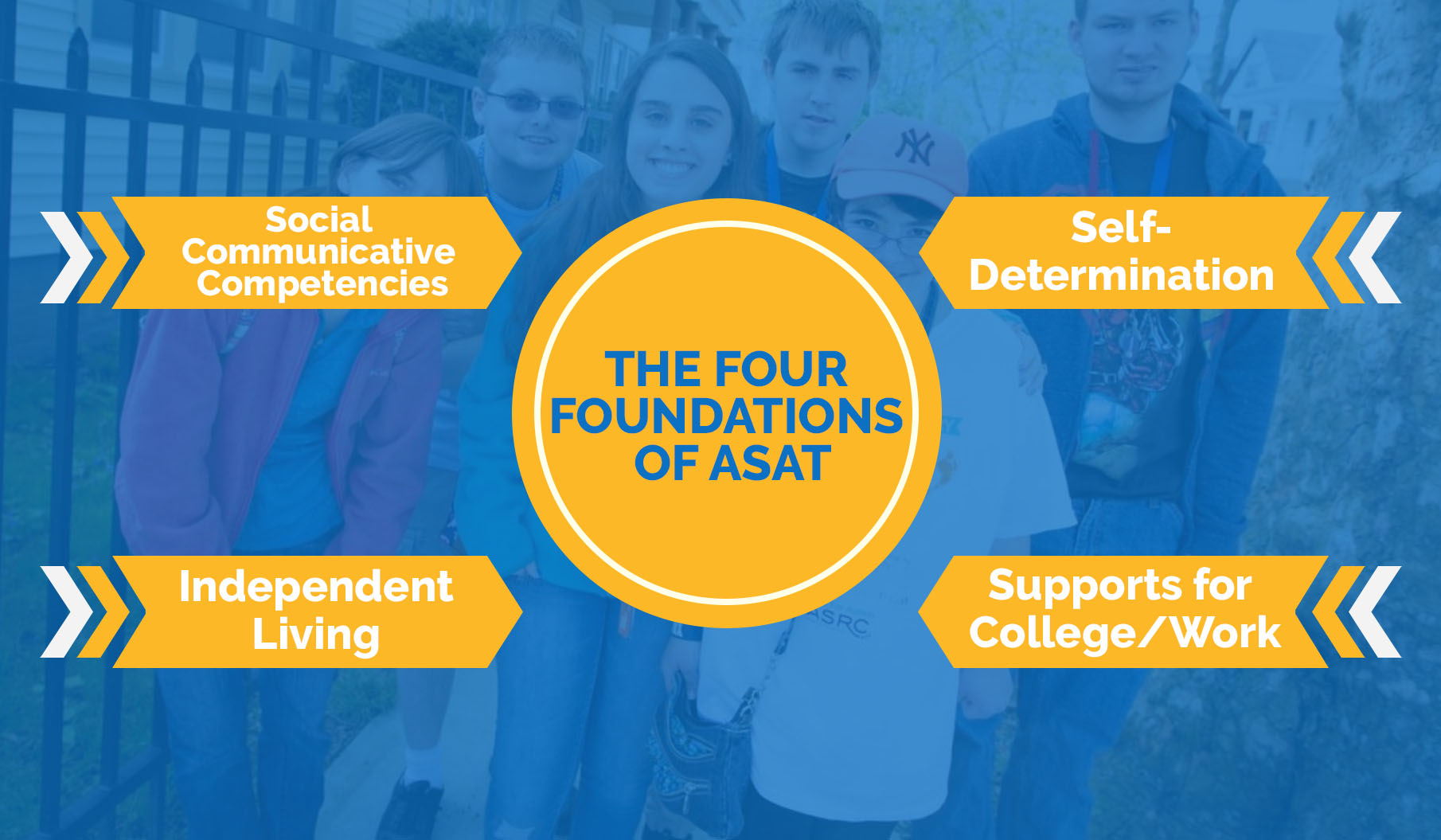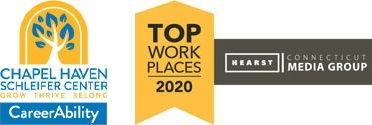
Social Communicative Competencies (SCC)
The ASAT program is nationally unique in its focus on social communication. The SCC curriculum was designed by a team of experts and centers around a core component of social communicative competency (SCC).
Living in an apartment with roommates, managing an academic schedule and transitioning into productive and meaningful work, all require that students compromise, solve problems, and advocate for their needs.
This highly important curriculum area provides opportunities for:
 Development of appropriate interpretation and use of nonverbal communication, such as facial expressions, gestures and physical proximity, in a variety of contexts and settings;
Development of appropriate interpretation and use of nonverbal communication, such as facial expressions, gestures and physical proximity, in a variety of contexts and settings; Instruction in receptive language skills, developing the individual’s ability to respond to information that is presented both visually and auditorially;
Instruction in receptive language skills, developing the individual’s ability to respond to information that is presented both visually and auditorially; Demonstration of increased expressive language skills in a variety of contexts, including but not limited to speech clarity, speed, phrasing, the correct use of formal and informal language, figurative language, irony, metaphors and non-literal language; and Development of perspective-taking theory of mind skills is the cornerstone of the social communication curriculum.
Demonstration of increased expressive language skills in a variety of contexts, including but not limited to speech clarity, speed, phrasing, the correct use of formal and informal language, figurative language, irony, metaphors and non-literal language; and Development of perspective-taking theory of mind skills is the cornerstone of the social communication curriculum.
Social Communicative Competencies (SCC)
The ASAT program is nationally unique in its focus on social communication. The SCC curriculum was designed by a team of experts and centers around a core component of social communicative competency (SCC).
Living in an apartment with roommates, managing an academic schedule and transitioning into productive and meaningful work, all require that students compromise, solve problems, and advocate for their needs.
This highly important curriculum area provides opportunities for:
 Development of appropriate interpretation and use of nonverbal communication, such as facial expressions, gestures and physical proximity, in a variety of contexts and settings;
Development of appropriate interpretation and use of nonverbal communication, such as facial expressions, gestures and physical proximity, in a variety of contexts and settings; Instruction in receptive language skills, developing the individual’s ability to respond to information that is presented both visually and auditorially;
Instruction in receptive language skills, developing the individual’s ability to respond to information that is presented both visually and auditorially; Demonstration of increased expressive language skills in a variety of contexts, including but not limited to speech clarity, speed, phrasing, the correct use of formal and informal language, figurative language, irony, metaphors and non-literal language; and Development of perspective-taking theory of mind skills is the cornerstone of the social communication curriculum.
Demonstration of increased expressive language skills in a variety of contexts, including but not limited to speech clarity, speed, phrasing, the correct use of formal and informal language, figurative language, irony, metaphors and non-literal language; and Development of perspective-taking theory of mind skills is the cornerstone of the social communication curriculum.
Self-Determination
The second component of the curriculum which is blended into all instruction is self-determination.
This is an individual’s awareness of personal strengths and weaknesses, the ability to set achievable goals and make choices, to be assertive at appropriate times and to interact with others in a socially competent manner.
These skills are taught by aiding the individual to identify his own emotions, needs, interests, and values as well as to develop an understanding of his strengths and limitations.
A Community Integration Approach: Because Chapel Haven is highly
individualized, we intentionally tailor each resident’s curriculum journey according
to their strengths and abilities so that they can progress at their own speed.
Self-Determination
The second component of the curriculum which is blended into all instruction is self-determination.
This is an individual’s awareness of personal strengths and weaknesses, the ability to set achievable goals and make choices, to be assertive at appropriate times and to interact with others in a socially competent manner.
These skills are taught by aiding the individual to identify his own emotions, needs, interests, and values as well as to develop an understanding of his strengths and limitations.
A Community Integration Approach:
Because Chapel Haven is highly
individualized, we intentionally tailor each resident’s curriculum journey according to their strengths and abilities so that they can progress at their own speed.
Independent Living
Transitional Housing
Some individuals may benefit from living in apartments on the Chapel Haven campus, with private bedrooms and shared common space. They receive individualized staff supports to help them further develop the day-to-day skills necessary for independent living. Such supports may include: menu planning, grocery shopping, budgeting and banking, meal preparation and apartment maintenance. This program is ideal for adults who are capable of managing their daily and overnight needs without 24/7 direct oversight, but with access to staff on call if needed.
The housing is centered in two multi-family apartment buildings, where participants live in two- and three-bedroom apartments, each person having a private bedroom. The buildings, all located within the same block, are adjacent to Chapel Haven’s main campus. Much of the teaching is done in settings in the community, but participants also receive instruction in classrooms located in the Bershaw-Boswell Community Center on campus.
Independent Living
Transitional Housing
Some individuals may benefit from living in apartments on the Chapel Haven campus, with private bedrooms and shared common space. They receive individualized staff supports to help them further develop the day-to-day skills necessary for independent living. Such supports may include: menu planning, grocery shopping, budgeting and banking, meal preparation and apartment maintenance. This program is ideal for adults who are capable of managing their daily and overnight needs without 24/7 direct oversight, but with access to staff on call if needed.
The housing is centered in two multi-family apartment buildings, where participants live in two- and three-bedroom apartments, each person having a private bedroom. The buildings, all located within the same block, are adjacent to Chapel Haven’s main campus. Much of the teaching is done in settings in the community, but participants also receive instruction in classrooms located in the Bershaw-Boswell Community Center on campus.
College / Vocational Supports
A fundamental goal of the ASAT program is to help our adults prepare for careers and college. Our approach is highly individualized. For some students, the college environment will offer the opportunity to sample classes and perhaps matriculate; for others, exposure to vocational opportunities may be a priority. Some adults come to Chapel Haven with some degree of college already completed. Our location in a college town supports many choices in the area of college, vocational and professional studies.
Post-secondary Options
The ASAT program’s location in historic Westville Village means students are only two miles west of downtown New Haven and close to several colleges and universities. Working closely with staff, students may register for and begin attending local colleges, with tailored support in the areas of executive functioning, planning and time management. Students can choose among several choices in a college town. ASAT offers an optional social communication class through the Communications Disorder Program at Southern Connecticut State University, for which they earn a college credit and develop social skills while interacting with typical college peers.
Popular college choices include:
![]() Southern Connecticut State University (www.southernct.edu): an easy walk or bus ride from campus; one of four universities in the CT state system
Southern Connecticut State University (www.southernct.edu): an easy walk or bus ride from campus; one of four universities in the CT state system
![]() Gateway Community College (www.gatewayct.edu)
Gateway Community College (www.gatewayct.edu)
![]() University of New Haven (www.newhaven.edu)
University of New Haven (www.newhaven.edu)
College / Vocational Supports
A fundamental goal of the ASAT program is to help our adults prepare for careers and college. Our approach is highly individualized. For some students, the college environment will offer the opportunity to sample classes and perhaps matriculate; for others, exposure to vocational opportunities may be a priority. Some adults come to Chapel Haven with some degree of college already completed. Our location in a college town supports many choices in the area of college, vocational and professional studies.
Post-secondary Options
The ASAT program’s location in historic Westville Village means students are only two miles west of downtown New Haven and close to several colleges and universities. Working closely with staff, students may register for and begin attending local colleges, with tailored support in the areas of executive functioning, planning and time management. Students can choose among several choices in a college town. ASAT offers an optional social communication class through the Communications Disorder Program at Southern Connecticut State University, for which they earn a college credit and develop social skills while interacting with typical college peers.
Popular college choices include:
Southern Connecticut State University (www.southernct.edu): an easy walk or bus ride from campus; one of four universities in the CT state system
Gateway Community College (www.gatewayct.edu)
University of New Haven (www.newhaven.edu)

